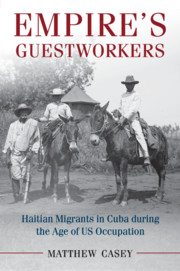Book contents
- Frontmatter
- Contents
- List of Figures, Maps, and Tables
- Acknowledgments
- Introduction
- Prologue: Experiencing the Unevenness of Empire
- 1 Making the Haitian Cuban Border and Creating Temporary Migrants
- 2 Leaving US-Occupied Haiti
- 3 Living and Working on Cuban Sugar Plantations
- 4 Picking Coffee and Building Families in Eastern Cuba
- 5 Creating Religious Communities, Serving Spirits, and Decrying Sorcery
- 6 Mobilizing Politically and Debating Race and Empire in Cuban Cities
- 7 Returning to Haiti and the Aftermath of US Occupation
- Epilogue: Enduring Legacies and Post-Colonial Divergences
- Bibliography
- Index
6 - Mobilizing Politically and Debating Race and Empire in Cuban Cities
Published online by Cambridge University Press: 27 April 2017
- Frontmatter
- Contents
- List of Figures, Maps, and Tables
- Acknowledgments
- Introduction
- Prologue: Experiencing the Unevenness of Empire
- 1 Making the Haitian Cuban Border and Creating Temporary Migrants
- 2 Leaving US-Occupied Haiti
- 3 Living and Working on Cuban Sugar Plantations
- 4 Picking Coffee and Building Families in Eastern Cuba
- 5 Creating Religious Communities, Serving Spirits, and Decrying Sorcery
- 6 Mobilizing Politically and Debating Race and Empire in Cuban Cities
- 7 Returning to Haiti and the Aftermath of US Occupation
- Epilogue: Enduring Legacies and Post-Colonial Divergences
- Bibliography
- Index
Summary
In 1942, Antoine Bervin was appointed by Haitian president Elie Lescot to travel on a “moral and cultural mission” to Cuba. As Bervin, an individual hailing from Haiti's elite, understood it, the motivation for sending him was simple: “Over there, they wrongly imagine that all Haitians are cane cutters.” During his three-year stay in Havana, Bervin met with President Fulgencio Batista and members of the Cuban diplomatic corps. He triumphantly described the moment when he pressured the Cuban government to pay an indemnity to the mother of Félix Alphonse, a Haitian rural worker who had been murdered in Cuba over a decade earlier. Bervin's interactions with living and breathing Haitians were more ambivalent, however. Mlle Constance Edouard greeted Bervin with warmth and gave him a sweater. In a gesture of goodwill and expectation, a group of Haitians in a Cuban prison presented Bervin with a hand-carved stamp with his name inscribed among “tropical landscapes.” Others brought only their anger. On the same day that he met the imprisoned Haitians, Bervin was visited by Frédéric Cole, someone who showed “the ruggedness of the [Haitian] generals” of the nineteenth century, an oblique references to Cole's rural roots and dark skin. After questioning whether Bervin “was really a Haitian,” Cole made some “reflections” that were “very severe toward those who had represented Haiti in Havana” in previous years. Bervin would eventually record these and other experiences for Haitian readers in a book called Mission à la Havane. He was one of hundreds of literate Haitians who lived and worked in Cuba's urban spaces and maintained communication with Haiti through a thriving print culture. His published memoirs embody this perfectly.
Unlike Bervin, most lived in the eastern Cuban cities of Santiago and Guantánamo. Through their writings, they influenced public opinion in Haiti and Cuba by detailing their firsthand experiences in both countries. Literate Haitians’ writings and political actions in eastern Cuba must be interpreted in both transnational and intra-imperial terms. Writing from eastern Cuba gave them a unique opportunity to bypass Haitian censorship laws and to criticize the US occupation of Haiti. However, Cuba had its own constraints. Haitian writers were required to conform to Cuban norms that circumscribed the ways that people of African descent could talk about race or organize politically.
- Type
- Chapter
- Information
- Empire's GuestworkersHaitian Migrants in Cuba during the Age of US Occupation, pp. 205 - 234Publisher: Cambridge University PressPrint publication year: 2017

